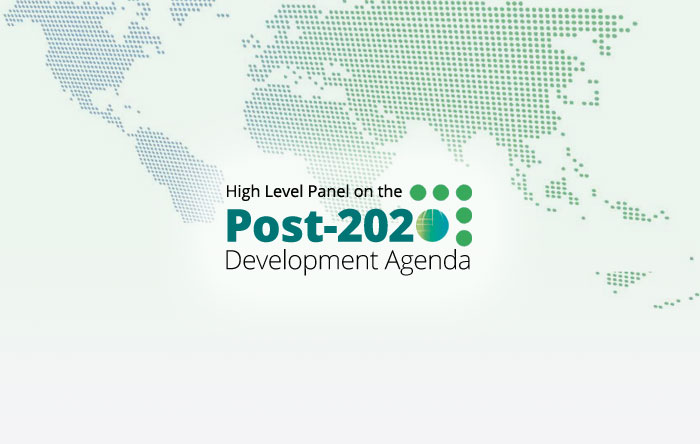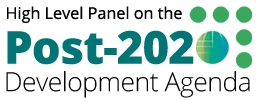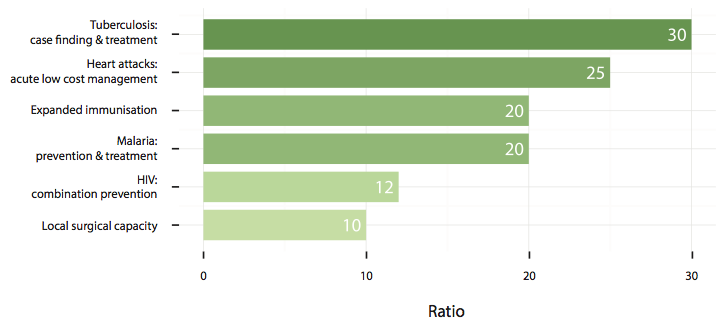4. Ensure Healthy Lives

a) End preventable infant and under-5 deaths
b) Increase by x% the proportion of children, adolescents, at-risk adults and older people that are fully vaccinated
c) Decrease the maternal mortality ratio to no more than x per 100,000
d) Ensure universal sexual and reproductive health and rights
e) Reduce the burden of disease from HIV/AIDS, tuberculosis, malaria, neglected tropical diseases and priority non-communicable diseases
Health enables people to reach their potential. Healthy children learn better. They become healthy adults. Healthy adults work longer and more regularly, earning higher and more regular wages. Though we focus on health outcomes in this goal, to achieve these outcomes requires universal access to basic healthcare.
We must start with a basic commitment to ensure equity in all the interconnected areas that contribute to health (social, economic and environmental). But in addition, we must make steady progress in ensuring Universal Health Coverage and access to quality essential health services. That means reaching more people, broadening the range of integrated, essential services available to every person, and ensuring that services are affordable for all. Countries at all income levels have work to do to reach this ideal.
The Panel chose to focus on health outcomes in this goal, recognising that to achieve these outcomes requires universal access to basic healthcare. Health outcomes are often determined by social, economic and environmental factors. Discrimination can create barriers to health services for vulnerable groups and lack of protection leaves many individual and families exposed to sudden illness and the catastrophic financial effects this can bring. Investing more in health, especially in health promotion and disease prevention, like vaccinations, is a smart strategy to empower people and build stronger societies and economies.
Almost 7 million children die before their fifth birthday, every single year. For the most part, these deaths are easily preventable. We know that the solutions are simple and affordable: having skilled birth attendants present; keeping babies warm and getting them safe water, nutritious food, proper sanitation, and basic vaccinations. Many children who die before they reach their fifth birthdays are born to mothers living in poverty, or in rural communities, or who are still in adolescence or otherwise vulnerable. By ending preventable child deaths, we are aiming for an upper threshold of 20 deaths per 1000 live births in all income quintiles of the population.
Women continue to die unnecessarily in childbirth. The World Health Organization estimates that every minute and a half, a woman dies from complications of pregnancy or childbirth. Women living in poverty, in rural areas, and adolescents are especially at risk. Timely access to well-equipped facilities and skilled birth attendants will drastically reduce this risk. Universal access to sexual and reproductive health and rights (SRHR) is an essential component of a healthy society. There are still 222 million women in the world who want to prevent pregnancy but are not using effective, modern methods of contraception. This results in 80 million unplanned pregnancies, 30 million unplanned births and 20 million unsafe abortions every year. About 340 million people a year are infected by sexually-transmitted diseases. Every $1 spent on modern contraception would save $1.40 in maternal and newborn health care. But access to SRHR, especially by adolescents, is low. The quality of such services is generally poor. The public health case is clear – ensuring these rights benefits not only individuals, but broader communities.
In high-income countries, rising health costs are a major threat to fiscal stability and long-term economic growth. Obesity is a growing problem. When people live longer, they face increased rates of cancer, heart disease, arthritis, diabetes and other chronic illness. On average, people lose 10 years of their lives to illness, mostly to non-communicable diseases. These should be addressed, but the priorities will vary by country.
The benefits of investing in health are immediate and obvious, both for specific interventions and for strengthening health systems more broadly. Immunisations save 2 to 3 million lives each year. Bed-nets are a well-known and affordable way to ward off malaria. Education that leads people to understand and use quality health services is a useful complement.
The table below shows how the benefits of investing in health outweigh the costs. Every $1 spent generates up to $30 through improved health and increased productivity.
Affordable solutions are within reach. Modern medicine and improved treatment can help, as can a range of other factors, such as cleaner air, more nutritious food and other parts of the interconnected post-2015 agenda. Ensuring healthy lives will be an ongoing process in all countries and communities.

